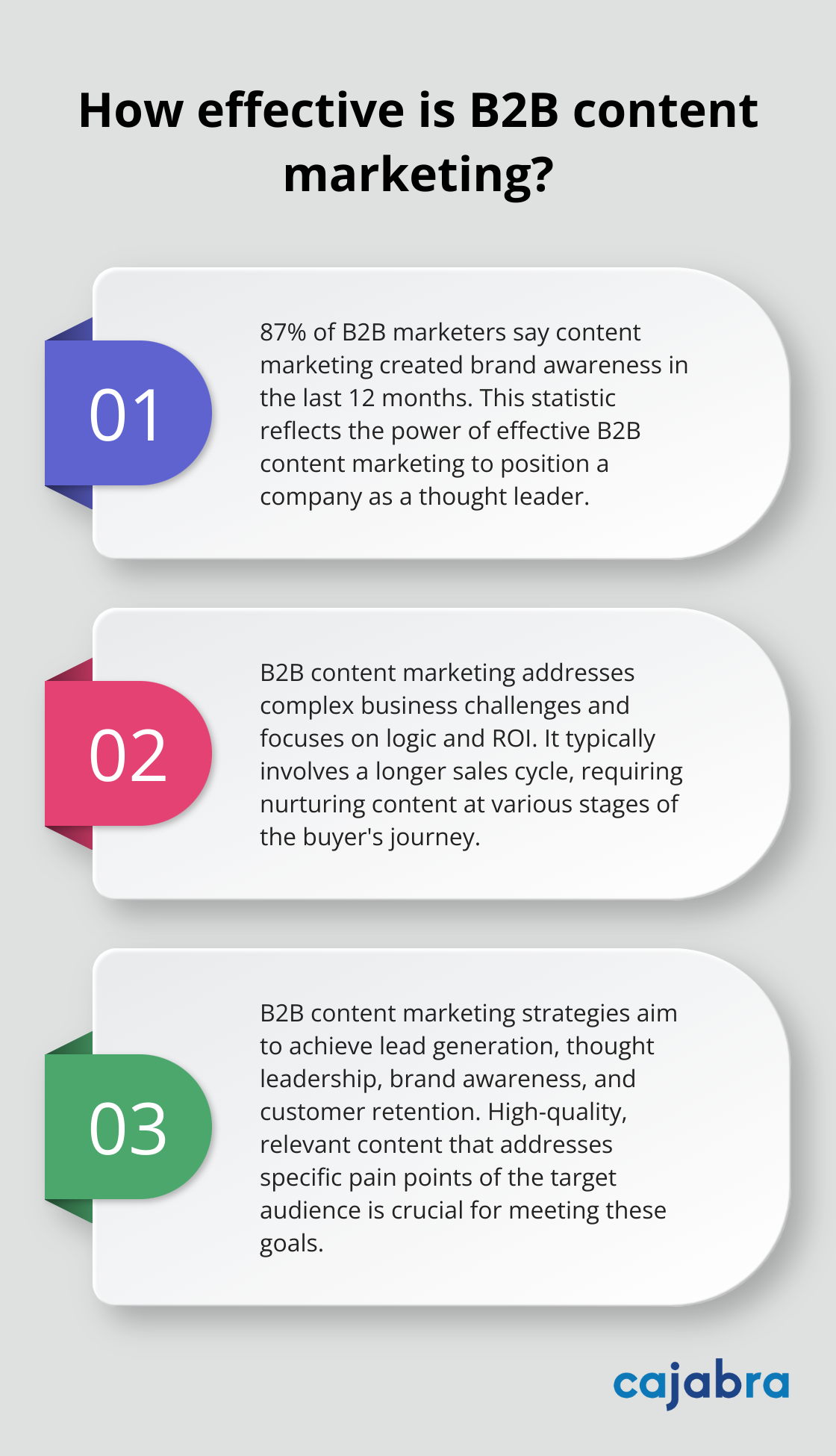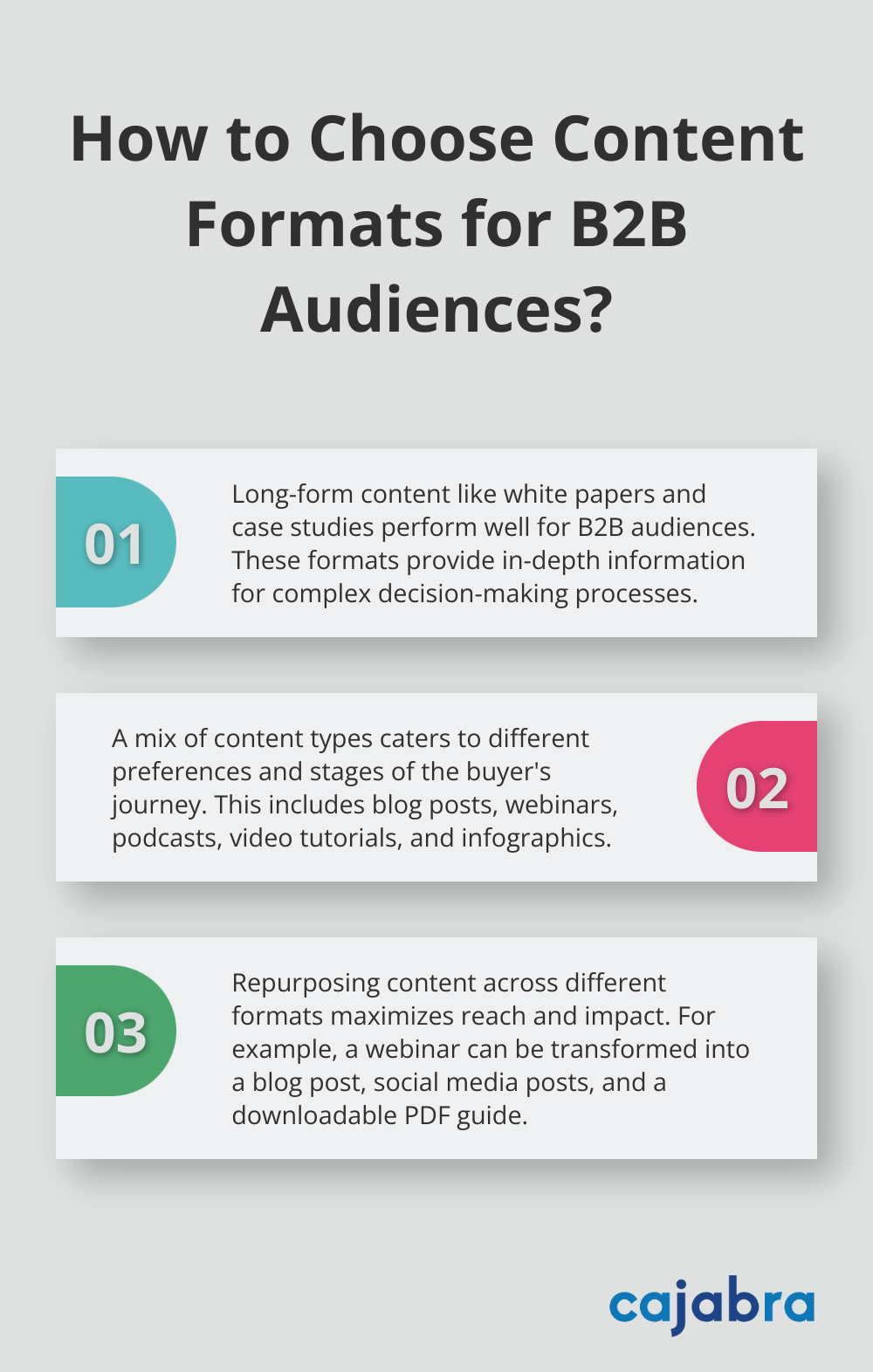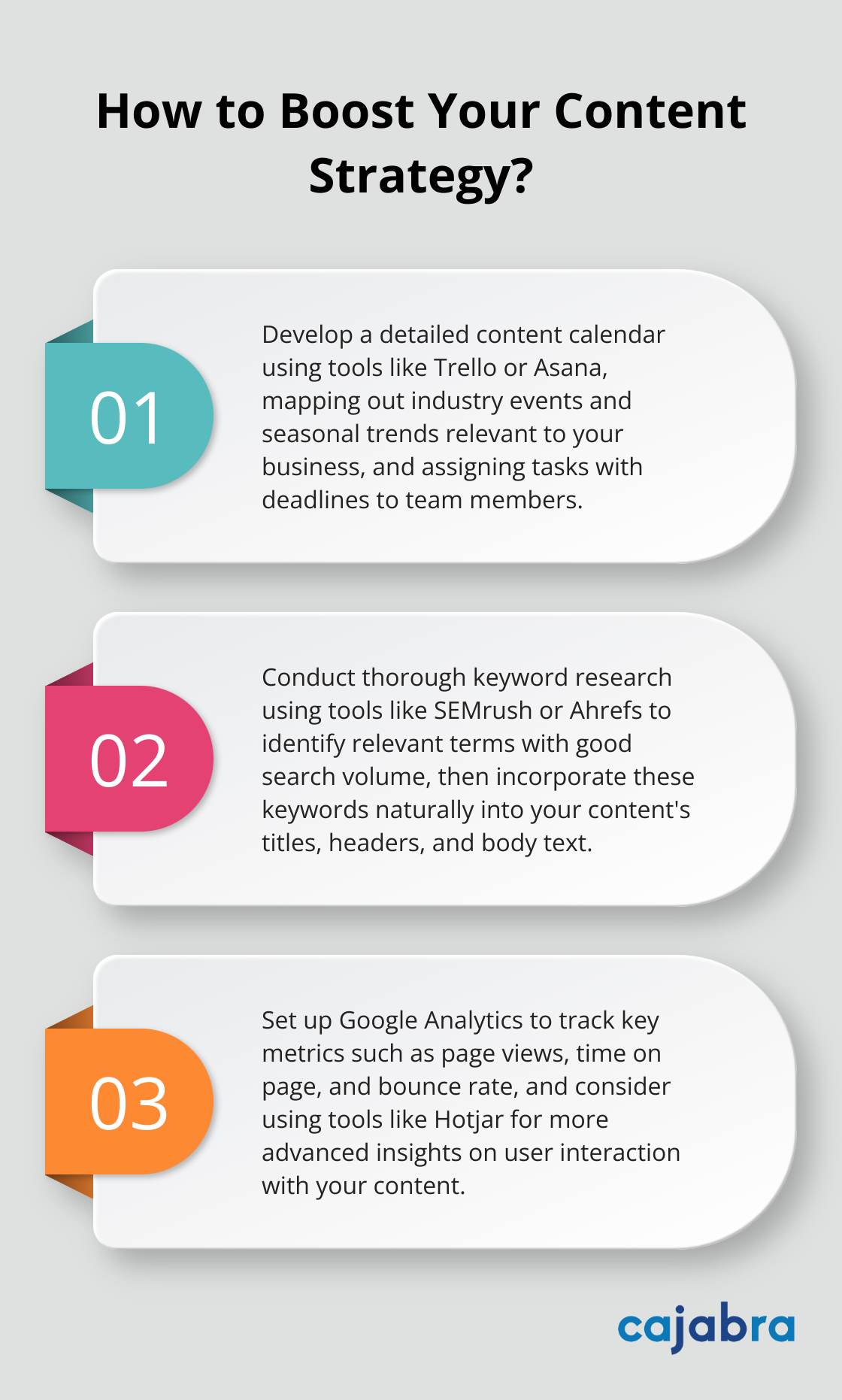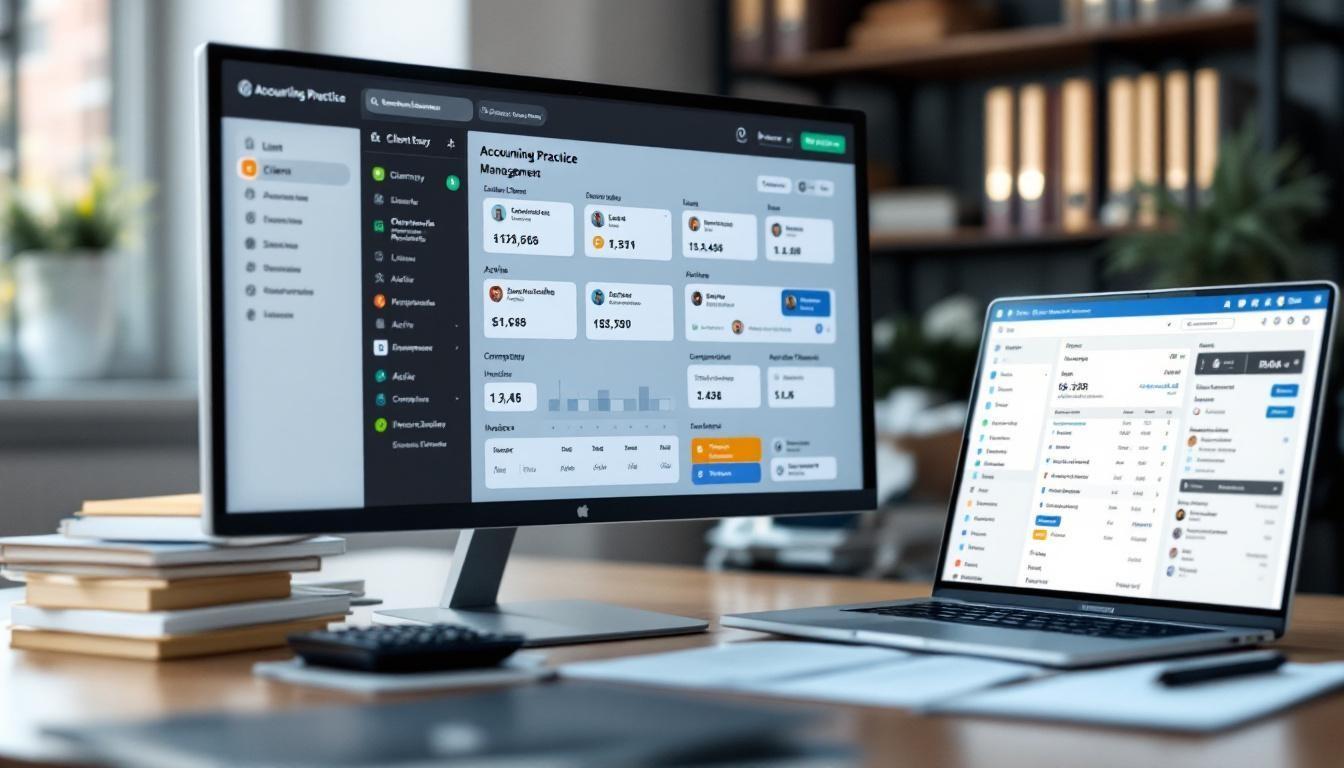
B2B content marketing is a powerful tool for businesses to attract, engage, and convert other companies. At Cajabra, LLC, we've seen firsthand how a well-crafted B2B content marketing strategy can drive growth and establish industry authority.
In this post, we'll guide you through the process of creating a winning B2B content marketing strategy that delivers results. From understanding your audience to measuring performance, we'll cover the essential steps to elevate your content game and outshine your competitors.
B2B content marketing is a set of strategies to distribute and deliver valuable content to your target audience to attract, engage, and generate new leads and customers. It provides solutions to other businesses' problems through informative and engaging content.
B2B content marketing has become a cornerstone of modern business strategies. Eighty-seven percent of B2B marketers say content marketing created brand awareness in the last 12 months. This surge reflects the power of effective B2B content marketing to position a company as a thought leader, build trust, and drive sales.
While both B2B and B2C content marketing engage audiences, they differ significantly in approach:

For example, a B2B software company might create in-depth white papers on industry trends, while a B2C clothing brand might focus on lifestyle-oriented social media posts. B2B content also typically involves a longer sales cycle, requiring nurturing content at various stages of the buyer's journey.
B2B content marketing strategies aim to achieve several key objectives:
To meet these goals, B2B marketers must create high-quality, relevant content that addresses specific pain points of their target audience. This might include case studies, webinars, or in-depth blog posts that showcase industry expertise.
HubSpot's Annual Inbound Marketing Trends Report emphasizes the importance of marketing teams' adaptability amid changing consumer preferences. This adaptability extends to content creation, where marketers must continuously refine their strategies based on audience feedback and performance metrics.
As we move forward, it's essential to understand how to develop a comprehensive B2B content marketing strategy that aligns with these goals and adapts to the ever-changing business landscape.
The foundation of any effective B2B content strategy is a thorough understanding of your target audience. Create buyer personas that represent your ideal clients. Include demographic information, job roles, challenges, and goals. For example, if you target CFOs in mid-sized manufacturing companies, research their specific pain points (such as managing cash flow during supply chain disruptions or implementing new financial technologies).

Use tools like LinkedIn Sales Navigator to identify and analyze potential clients. Conduct surveys or interviews with existing customers to gain insights into their decision-making processes and content preferences. This research will help you tailor your content to address their specific needs and speak their language.
A comprehensive competitor analysis will reveal gaps in the market that your content can fill. Review your competitors' websites, social media presence, and content offerings. Look for topics they don't cover or angles they miss. Tools like SEMrush or Ahrefs can help you identify the keywords and content types that perform well in your industry.
Pay attention to industry trends and emerging topics. For instance, in the accounting sector, you might notice a growing interest in blockchain technology for financial reporting. Create content that addresses these cutting-edge topics to position your company as a forward-thinking industry leader.
Your content marketing goals should align with your overall business objectives. Use the SMART framework to ensure your goals are Specific, Measurable, Achievable, Relevant, and Time-bound. For example, instead of a vague goal like "increase website traffic," try something more specific like "increase organic traffic to our blog by 50% within the next six months."
Other potential goals might include:
Not all content formats will work equally well for your audience. Based on your research, select the formats that resonate most with your target clients. For B2B audiences, long-form content like white papers and case studies often perform well, as they provide in-depth information for complex decision-making processes.
Consider creating a mix of content types to cater to different preferences and stages of the buyer's journey. This might include:
Repurpose your content across different formats to maximize its reach and impact. For instance, transform a webinar into a blog post, several social media posts, and a downloadable PDF guide.
As you implement these strategies, you'll create a B2B content marketing plan that speaks directly to your target audience and sets you apart from competitors. The next step is to put your strategy into action and optimize it for maximum impact.
A content calendar serves as your roadmap for consistent content creation and distribution. Map out key industry events, product launches, and seasonal trends relevant to your business. Plan your content around these milestones.

For example, if you target accountants, create content about tax preparation strategies in the months leading up to tax season. Use tools like Trello or Asana to manage your content calendar. Assign tasks to team members and set deadlines for each piece of content.
Quality trumps quantity in B2B content marketing. Focus on creating in-depth, well-researched content that provides real value to your audience. The Content Marketing Institute reports that 79% of the most successful B2B content marketers prioritize delivering relevant content to their audience over promotional content.
When you develop content, always keep your buyer personas in mind. If you target CFOs, create content that addresses their specific challenges (such as managing financial risk or implementing new accounting standards). Use data from reputable sources to back up your points and establish credibility.
SEO plays a pivotal role in the success of B2B marketing campaigns. It helps businesses increase their online visibility, attract quality leads, and ultimately drive conversions. Start with keyword research to identify terms your potential clients search for. Tools like SEMrush or Ahrefs help you find relevant keywords with good search volume and manageable competition.
Incorporate these keywords naturally into your content, including titles, headers, and throughout the body text. Avoid keyword stuffing, as this harms your search rankings. Instead, focus on creating comprehensive, high-quality content that answers your audience's questions.
Regular performance analysis refines your B2B content marketing strategy. Set up Google Analytics to track key metrics such as page views, time on page, and bounce rate. For more advanced insights, consider tools like Hotjar to see how users interact with your content.
Pay close attention to which types of content perform best. Do your webinars generate more leads than your blog posts? Do certain topics resonate more with your audience than others? Use these insights to inform your future content creation efforts.
The B2B landscape constantly evolves, and your content strategy should evolve with it. Regularly review your performance data and prepare to make adjustments. If a particular content format doesn't perform well, try something new.
For instance, if you notice that your long-form blog posts don't get much engagement, try breaking them down into shorter, more focused articles or transforming them into video content. The key is to remain flexible and responsive to your audience's needs and preferences.
A successful B2B content marketing strategy requires careful planning, execution, and continuous refinement. You must understand your audience, analyze your market, set clear goals, and select the right content formats to establish a solid foundation. Implement your strategy through consistent content creation, SEO optimization, and performance analysis to adapt and improve over time.

High-quality, relevant content builds trust with your audience and positions your brand as an industry thought leader. The digital landscape evolves rapidly, so experiment with new approaches to gain a competitive edge. Results may not appear immediately, but stay committed to your strategy and make data-driven adjustments as you learn what resonates with your target audience.
At Cajabra, we help accounting firms transform their marketing efforts and secure retainer-based clients. Our specialized services, including the JAB System™, can support your growth and maximize your online presence. Explore how Cajabra can elevate your firm's marketing strategy and position you as an industry leader in the competitive B2B landscape.



